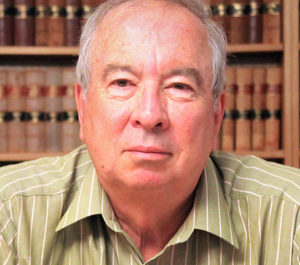
“Wit is said to be the ability to say or write things that are clever, unexpected and funny,” says CLIVE WILLIAMS in a column he’s written for a laugh…
WIKIPEDIA tells us that wit is a form of intellectual humour, and “a wit” is someone skilled in making witty remarks.

Oscar Wilde was famous for his clever witticisms, such as: “Be yourself; everyone else is already taken” and “Some cause happiness wherever they go; others whenever they go.”
W Somerset Maugham was well known for them too: “At a dinner party one should eat wisely but not too well, and talk well but not too wisely.” Our own Paul Keating was a master of the witty sarcastic comment, as in: “He is simply a shiver looking for a spine to run up”.
According to the “Oxford Dictionary”: “Humour” is the quality of being amusing or comic, especially as expressed in literature or speech. Some countries and ethnicities are said to share a similar sense of humour, including Australia, France, Ireland, Russia, the UK, US – and Jewish people in general.
Online dating website eharmony (operating in Australia, Canada, the UK and US) has tried to match up partners taking into account their sense of humour. In the process they came up with nine types of humour.
The first was “physical humour”. This included slapstick humour of the kind where someone often gets hurt doing something stupid – most of “Australia’s Funniest Home Videos” seem to fall into this category. Judging by Japanese television shows they find this kind of humour very funny as well.
“Self-deprecating humour” is a favourite with comedians. When I was in Defence, I always used to tell a joke to relax an audience before doing a long presentation. With the arrival of ultra-political correctness in the 1980s the safest option was to tell a joke against oneself.
“Surreal humour” is the kind of humour featuring illogical events, absurd situations or nonsensical themes. Examples of this on television were “Monty Python”, “Black Books” and “Blackadder”. One well-known Monty Python skit featured John Cleese from the “Ministry of Silly Walks”. Another was a salesman trying to convince a customer that a dead parrot was in fact asleep.
“Improvisational humour” is where the person makes up jokes spontaneously. Many comedians have to work at being funny but Scottish comedian Billy Connolly was naturally funny and a master of improvised humour. Two off-the-cuff remarks were: “My definition of an intellectual is someone who can listen to the ‘William Tell Overture’ without thinking of the Lone Ranger” and “The great thing about Glasgow is that if there’s a nuclear attack it’ll look exactly the same afterwards.”
“Wordplay humour” is obviously a play on words, sometimes due to inadvertent mistakes, as in these church notices: “Remember in prayer the many who are sick of our church and community” and “Potluck supper Sunday at 5pm – prayer and medication to follow”.
Government workplaces before 1990 used to revolve around the registry. One autocratic head of registry was widely known as the “Lord of the Files”.
Meanwhile, Spike Milligan helpfully observed: “Contraceptives should be used on every conceivable occasion.”
“Topical humour” is based on current events or trends. American late-night shows with hosts such as Johnny Carson are noted for it. Donald Trump has been a prime target. Topical humour requires a thorough knowledge of what’s going on in the world and the ability to put a humorous spin on it: “Democracy is welcoming people from other lands, and giving them something to hold on to … usually a mop or a leaf blower.” (Johnny Carson) and “Of course Donald Trump has a Chinese bank account. He had to – he’s running out of things to be hypocritical about.” (Jimmy Kimmel)
“Observational humour” is the ability to poke fun at everyday life. Russians are fond of this kind of schadenfreude humour: “A grandson asks his grandfather: ‘Grandpa, is it true that in 1986 there was an accident at Chernobyl Nuclear Power Plant?’ ‘Yes, there was’, answers grandpa and pats the grandson’s head. ‘Grandpa, is it true that it had absolutely no consequences?’ ‘Yes, absolutely’, answers grandpa, patting the grandson’s second head.” As horse trainer Jeffrey Bernard observed: “One way to stop a runaway horse is to bet on him.”
“Bodily humour” is mostly to do with farts or other bodily functions. This type of crude humour tends to be popular with men and teenagers. Fart cushions fall into this category. Enough said!
“Dark humour” usually involves some dark, depressing underlying themes, but with some comical or unusual slant on the situation: Oscar Wilde’s rumoured last words as he lay dying of cerebral meningitis were: “This wallpaper will be the death of me. One of us will have to go.”
Boris Johnson as Foreign Secretary publicly called the civil war in Yemen “the world’s worst humanitarian crisis” while privately joking (in rather poor taste) that “with friends like these, who needs Yemenis.”
I would add “situational humour” to the nine. For example: “On my first day in New York a guy asked me if I knew where Central Park was. When I told him I didn’t, he said: ‘Would you mind if I mugged you here instead?'” (Paul Merton).
Situational television shows such as “Seinfeld” based on everyday life in New York have produced some of the best Jewish humour, while “Fawlty Towers” featuring a paranoid hotel manager in Torquay is a good example of non-PC English humour.
Closer to home, a fine example of sardonic situational Australian humour is the ABC TV series “Utopia” about bureaucratic ineptitude at the fictitious (but frighteningly real to Canberra public servants) “Nation Building Authority”.
Clive Williams is a Canberra public commentator and columnist.
Who can be trusted?
In a world of spin and confusion, there’s never been a more important time to support independent journalism in Canberra.
If you trust our work online and want to enforce the power of independent voices, I invite you to make a small contribution.
Every dollar of support is invested back into our journalism to help keep citynews.com.au strong and free.
Thank you,
Ian Meikle, editor





Leave a Reply